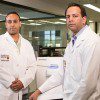
High-fat feeding can cause impairments in the functioning of the mesolimbic dopamine system, says Stephanie Fulton of the University of Montreal and the CHUM Research Centre (CRCHUM.) This system is a critical brain pathway controlling motivation. Fulton’s findings, published in Neuropsychopharmacology, may have great health implications. Continue reading















